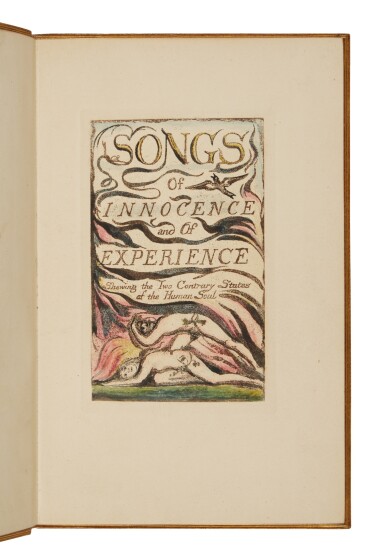Three Poets: William Blake, A. E. Housman, Robert Frost
Three Poets: William Blake, A. E. Housman, Robert Frost

William Blake | “Poems with very wild and interesting pictures”
Auction Closed
June 26, 03:40 PM GMT
Estimate
1,200,000 - 1,800,000 USD
Lot Details
Description
William Blake
Songs of Innocence and of Experience: Shewing the Two Contrary States of the Human Soul. [London:] The Author & Printer W Blake, 1789, 1794 [but 1795]
54 relief-etched plates on 54 leaves, etched and printed by Blake, colored by Blake and Catherine Blake. 53 plates trimmed to within a millimeter or two of the etching from larger sheets of unwatermarked wove paper of an undetermined size, each plate (ca. 110 x 70 mm) now inlaid to a larger sheet (197 x 117 mm) of late nineteenth-century wove paper “carefully indented at the joint of the inner and outer leaves (perhaps, as Keynes & Wolf suggest, ‘by putting each print, damped, in press with blank plate’) to look like plate-marks” (Bentley, Blake Books, p. 416). The remaining, fifty-fourth, plate, the frontispiece to Songs of Experience, might very well have been omitted from this copy when issued by Blake; it is from a different printing, on unwatermarked wove paper (162 x 124 mm), now lightly browned, and is matted separately from the others, which are bound in honey brown morocco by Riviere, ca. 1900, covers with simple border of two gilt fillets, spine gilt-ruled in six compartments with title lettered in second, gilt edges, marbled endpapers and linings; blue cloth slipcase.
The plates are printed in brown and black and beautifully and subtly colored with watercolor and pen in a bright, pastel palette of pink, blue, yellow, purple, orange, red, green, brown, gray, black, and white; the Experience frontispiece colored in a similar palette but rather more heavily and brightly. A few plates, notably “The Little Boy lost” and “The Little Boy found” are rendered in a powerfully stark grisaille.
Accompanied by an autograph manuscript signed by Samuel Taylor Coleridge (“S.T.C.”), [Highgate, 12 February 1818], 2 pages (222 x 182 mm) on a leaf of unwatermarked wove paper, accompanied by an autograph address leaf directed to Charles Augustus Tulk at St. John’s Lodge, Regent’s Park. Tulk had loaned Coleridge this copy of the Songs, and when Coleridge returned the book with a covering letter (not present), Coleridge included “this rude scrawl as to the order in which I was pleased by the several poems” (see below).
